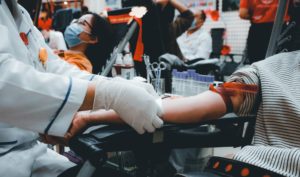Blood donation to be made more inclusive
People who want to donate blood, particularly Black African donors, will be able to do so more easily from the end of 2021.
The government has outlined plans to remove the question on sexual activity in Sub-Saharan Africa asked in the donor safety check.
Currently, prospective donors are asked if they have recently had sex with a partner who may ever have been sexually active in an area where HIV is endemic, which includes most of sub-Saharan Africa. If they have, the donor will be deferred for three months after the last sexual contact with that partner.
This can mean Black African donors and other potential donors in long-term relationships have been unable to donate blood.
People who are Black African, Black Caribbean and of Black mixed ethnicity are more likely to have the rare blood sub-group, such as Ro, that many Black sickle cell patients need.
This change will provide more opportunities for people to donate for the ongoing need for rarer blood types and help improve and save lives in the UK. Removing the question will help to improve inclusivity and equity for Black African, and other, donors.
Health bosses say the safety of those donating and those receiving blood and blood products remains the government’s highest priority.
Removing this question from the donor safety questionnaire will not compromise the safety of blood supply in the UK.
This step has been taken following research conducted by the FAIR (For Assessment of Individualised Risk) steering group and supported by the Advisory Committee on the Safety of Blood, Tissues and Organs (SaBTO), who both agreed that the question can safely be removed.
Other questions remain on the donor form to ensure individual, high risk behaviours, including recent travel to countries where HIV is endemic, are picked up and those donors are deferred from donation.
Deborah Gold, chief executive of National AIDS Trust, said: ‘We are delighted that the Secretary of State has confirmed this outdated, unnecessary and actively discriminatory question will be removed from blood donor screening forms.
‘The science is clear that this is unnecessary and does nothing to improve safety. Instead, it actively prevents much needed donors coming forward to give blood, particularly from black communities.
‘The change is long overdue, and we warmly welcome today’s announcement.’

The change follows recommendations from the FAIR steering group, a collaboration of experts in the UK blood services and LGBT+ charities led by NHSBT established in 2019. The steering group looked at the implications of the question and concluded it could safely be removed.
In the UK, all donations are tested for a multitude of possible infections, including HIV, and there are robust monitoring mechanisms in place to ensure safety of donors and recipients. It is estimated that the risk of an HIV infectious donation not being detected corresponds to one in 23 million.
The new changes will be reviewed twelve months following implementation by the FAIR steering group and SaBTO.
Chamut Kifetew, health equalities lead at Terrence Higgins Trust, said: ‘We’re glad this decision has been made that will enable more people, particularly those of African heritage, to safely donate much needed blood products in England.
‘It is based on the latest evidence to preserve the safety of the blood supply, helps maximise the number of potential donors and brings England in line with Scotland and Wales.
‘The removal of the question is particularly important as it eliminates one of the barriers which has until now played a role in preventing the recruitment of more donors from Black communities.
‘Now we need to see the work done to address wider health inequalities faced by Black people in the UK.’
Blood donation guidelines are set by DHSC and based on recommendations from SaBTO, which advises Health Ministers in all four UK nations, the UK blood services, and the NHS more widely on the most appropriate ways to ensure the safety of blood, cells, tissues and organs for transfusion or transplantation.
In June, further progress towards greater equality was made through a landmark change to blood donation by lifting a blanket deferral for men who have had sex with men in the last three months.
These changes will have no impact on the safety of blood in the UK as donation will focus on individual behaviour so only those who are at low risk will be able to give blood.
Health and social care secretary, Sajid Javid, said: ‘This is another progressive step forward, focusing on individual behaviours, rather than blanket deferrals, and reducing limitations for people to donate blood.
‘This will make it easier for black donors in particular to donate blood, ultimately saving lives.
‘We are creating a fairer system for blood donation. And as we recover from this pandemic, we are committed to levelling up society, which includes improving access to services for everyone.’
Photo Credit – Nguyễn Hiệp












